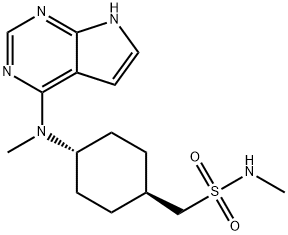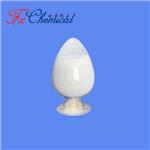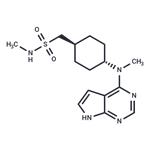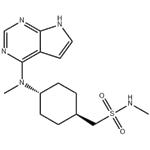Description
Oclacitinib is an oral JAK inhibitor that is a drug approved by the U.S. Food and Drug Administration (FDA) for use in canine atopic dermatitis (AD). The U.S. FDA and the European Medical Association have approved a number of JAK inhibitors, including baricitinib, ruxolitinib, federatinib, tofacitinib, upadacitinib, oclacitinib, but some of these drugs are still being studied. Oclacitinib mainly shows activity against JAK1-dependent cytokines and also inhibits the function of JAK2-dependent cytokines. oclacitinib modifies the production of cytokines such as IL-4 and IL-13, which are crucial for B-cell proliferation and maturation in the pathogenesis of pemphigus foliaceus. Oclacitinib could interdict the effects of IL-6, a cytokine involved in the Toll-like receptor 4-originated signaling pathway in the bladder epithelial cells, and IL-8, which could theoretically contribute to a decreased defense against the urinary pathogens[1-4].
Uses
Oclacitinib is a novel Janus kinase (JAK) inhibitor with activity against cytokines involved in allergy.
Biological Activity
janus kinase (jak) enzymes are involved in cell signaling pathways activated by cytokines dysregulated in allergy. pf-03394197 (oclacitinib) is a novel janus kinase inhibitor.
in vitro
pf-03394197 inhibited jak family members by 50% at concentrations ranging from 10 to 99 nm and did not inhibit a panel of 38 non-jak kinases. pf-03394197 was most potent at inhibiting jak1. pf-03394197 also inhibited the function of jak1-dependent cytokines involved in allergy and inflammation as well as pruritus. pf-03394197 had minimal effects on cytokines which did not activate the jak1 enzyme in cells [1].
in vivo
pf-03394197 administered orally at a dose of 0.4–0.6 mg/kg twice daily was safe and efficacious in controlling the pruritus associated with allergic dermatitis. pf-03394197 provided itch relief within 24 h that persisted through the treatment period, with over 70% of the treated dogs achieving a >50% reduction in pruritus by day 7 [2].
References
[1] Xin P, et al. The role of JAK/STAT signaling pathway and its inhibitors in diseases. International Immunopharmacology, 2020; 80: 549-56.
[2] Kalantari Y, et al. A literature review on Janus kinase (JAK) inhibitors for the treatment of immunobullous disorders. International Immunopharmacology, 2022; 110: 108923.[3] Erickson S, et al. New and emerging treatments for inflammatory itch. Annals of Allergy, Asthma Immunology, 2020; 126: 13-20.
[4] Xu P, et al. Janus kinases (JAKs): The efficient therapeutic targets for autoimmune diseases and myeloproliferative disorders. European Journal of Medicinal Chemistry, 2020; 129: 112155.



